Gorjana Kisa, like Mirza Nurkic, is originally from Sarajevo, in what was once Yugoslavia. She and Mirza make up the first two parts of this chapter. Mirza was born in 1987. His family, as Bosnian Muslims, migrated directly to Sydney in 1988, anticipating a worsening of ethnic and political strife in Bosnia-Herzegovina. Gorjana was born in 1983. Her family, which she identifies as Serbian Orthodox Christian, first migrated to Belgrade to escape the rising prejudice against Bosnian Serbs before moving to Sydney in 2001 as refugees from the increasing violence of the Bosnian War, leaving behind their possessions and homes first in Sarajevo and then in Belgrade. These experiences, she says, strengthened the family members’ ties to one another and heightened their understanding of the fact that local material conditions can change rapidly in unstable times.
The complexly articulated social formations of globalization and ICT diffusion provided a dynamic backdrop for the lives of Gorjana and Mirza. Read and listen to their interpretations of their transnational literate lives from Sarajevo to Sydney. Introducing each video is a sampling of their responses in their own words. Also included are links to complete transcripts of the video clips.
CHAPTER 2: Gorjana Kisa
"We came to Sydney actually as refugees from Belgrade.… in Sarajevo, because of the war, we had to leave our house and all our belongings and we moved to Belgrade.… However, [in Belgrade] there was another war in 1999 and that's where we had to leave everything all over again, and that's when we came to Sydney."
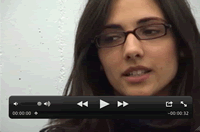
Gorjana on coming to Sydney <transcript>
"[W]e just realized that all the material things around us can disappear very quickly and that what's important is that we keep our bonds really strong.…"
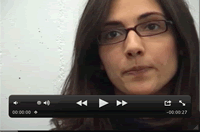
Gorjana on realizing how material circumstances can change <transcript>
.gif)
Gorjana with friends in front of King's College
Education remains an important consideration for Gorjana. Whether traveling with friends to Cambridge or discussing her own parents' education and professional lives, she conveyed a story of movement in which education occupied a central role.
"My dad's an economist…and my mom…completed three years of law."
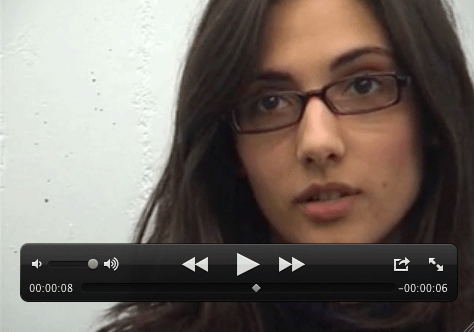
Gorjana discusses her parents' educational and professional backgrounds <transcript>
Despite her family's migration experiences, the literacy environment in which Gorjana grew up was richly textured, enhanced by multiple spoken and written languages. Gorjana, her 19-year-old sister, and their parents speak, read, and write both Serbo-Croatian and English.
"Yes, we all read a lot, actually…. Even on the Internet, my parents read the news and some articles, same as me and my sister."
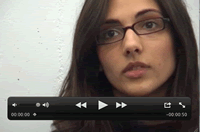
Gorjana on her own literate practice <transcript>
"And of course we all speak Serbian at home.… My mom's English is, I think it's pretty good, actually…she works [here in Sydney].…"
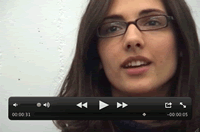
More on Gorjana's language practices <transcript>
"I started school when I was 6 years old…I already knew how to read and write."
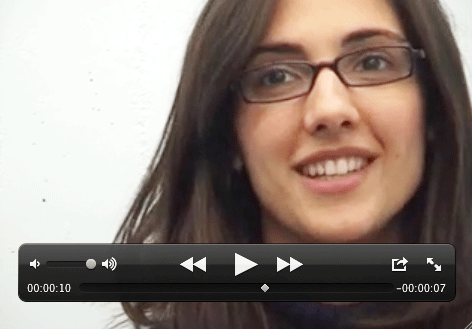
Gorjana on first learning to read <transcript>
Gorjana smiles as she tells us how her family had prepared her well for school. This preparation would extend into the digital realm: Both Gorjana's and Mirza's families also were able to provide their children with access to digital communication environments at home. Gorjana's family, for example, bought their first computer in 1999, when she was in high school in Belgrade, Serbia, and at first, she was the only one who knew how to use it. But that situation changed rapidly as she taught her parents how to use the machine and her sister taught herself how to do so.
"Yes, I taught my parents how to use [computers]…I didn't have to teach my sister."

Gorjana on teaching her parents to use computers <transcript>
'"When they [my parents] need to keep in touch with people—friends and family here and overseas—it depends really who it is.… If it's some other friends of their age, they send them e-mails, usually, or give them a call, probably not text messages.…"

Gorjana on her parents' engagement with digital media <transcript>
Gorjana was convinced by these and other experiences that most young people discover how to use computer applications by themselves, just as she did, without a great deal of formal instruction. By the time we talked to her in 2007, Gorjana noted that her parents were using the family computer along with their cell phones to stay in touch with friends and family in Bosnia and Serbia—choosing the specific mode of communication they used (e-mail, phone calls, letters) to match that of the person they were contacting. During her high school years, Gorjana used the family computer primarily for writing assignments and for chatting online with friends. And while she clearly appreciated the value of computers and other information technologies for these pragmatic purposes, she was not supportive at the time of some online activities—computer games and MySpace, for example—that distracted young people from interactions with family or friends: the “real things” in life.
It wasn’t until her university studies began in Australia that Gorjana began to use computers regularly in her schoolwork. By that time, however, it was quite clear to both her and her family that—within the context of increasingly technological local and global cultures—computers had become a necessity rather than a luxury.
"It took a bit of time for my parents to get used to it and to learn how to use it and what they can actually do [with the computer].…"
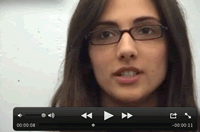
Gorjana on learning to use computers with her parents <transcript>
"I write e-mails to my friends, and I have a couple of friends to whom I write real letters. And we also meet in chat rooms and sometimes even video conversation….
all different kinds of new technologies I use to talk to my friends."
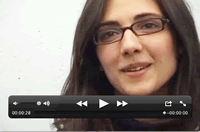
Gorjana on communicating with friends overseas <transcript>.
"I think it's a matter of convenience. Sometimes we talk a lot more if we meet and we can have a chat and have video conversation. We end up telling each other a lot more than just writing an e-mail."
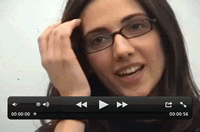
Gorjana on what determines the communication mode she chooses <transcript>
Like so many of her peers, Gorjana is able to draw on a variety of communication technologies, her choices being driven as much by convenience as by her particular context. Like Mirza, who we will meet in the next section, Gorjana offers a literacy narrative that has been shaped by intense political turmoil, movement across time and space, and the ever-changing technologies that provide new affordances for communicating.
previous < > CHAPTER 2: Mirza Nurkic



.gif)






